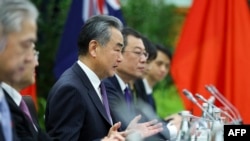Chinese Foreign Minister Wang Yi will make his first trip to Australia in seven years Wednesday, a visit that some analysts say will be dominated by efforts to resolve remaining trade disputes between Beijing and Canberra even as the two seek to address contentious consular and security issues.
Wang will hold meetings with Australian Prime Minister Anthony Albanese and his Australian counterpart Penny Wong during his time in Australia, according to the Chinese Foreign Ministry.
Top of the agenda will be talks about removing Chinese tariffs on Australian wine, a decision Beijing made in 2020 amid a fierce bilateral diplomatic dispute.
At the time, Chinese authorities said Australia was guilty of anti-competitive behavior. The tariffs were lodged after Canberra put its support behind an independent investigation into the origins of the COVID-19 pandemic.
The move caused the value of Australian wine exports to China, which was at more than $662 million at its height, to drop to just $6.6 million last year.
Last week, an interim statement from China’s Ministry of Commerce suggested that the tariffs could be lifted within weeks. Australian Prime Minister Anthony Albanese confirmed that he would discuss the issue with Wang during their bilateral meeting on Saturday, saying that Beijing could reopen the Chinese market to Australian wine “in the coming weeks” and the development will be a “win-win” for both countries.
Since coming to power in May 2022, the Albanese administration has tried to reduce tension between China and Australia while promising to ensure the removal of Chinese tariffs on a wide range of Australian commodities. Since then, Beijing has lifted import restrictions on Australian beef, barley, coal, and cotton.
“Both sides want to move down the route of normalizing trade relations and get Australian exports back into the Chinese market,” said Benjamin Herscovitch, a research fellow at Australian National University, told VOA by phone.
Experts say Wang will likely push Australia to ease restrictions on Chinese investment in the country while seeking Canberra’s support for China’s attempt to join the Comprehensive and Progressive Agreement for Trans-Pacific Partnership, or CPTPP.
“I think Wang will raise CPTPP and will try to get some sort of progress with Australia on a bilateral basis,” Alex Bristow, a senior analyst at the Australian Strategic Policy Institute (ASPI,) told VOA in a video interview.
Sensitive issues
Despite signs of warming bilateral trade relations, Herscovitch says there are still fundamental disagreements between Beijing and Canberra over a range of contentious issues.
“Australia will likely focus on consular cases and contentious human rights and geopolitical issues,” he told VOA, adding that the case of detained Australian writer Yang Hengjun, who received a suspended death sentence from a Chinese court last month, will be “the highest priority” for Canberra.
After Yang received a suspended death sentence from a Chinese court, Australian Foreign Minister Penny Wong described the decision as “harrowing” and “appalling,” and vowed to continue advocating for justice for the detained Australian writer.
In response to inquiries about Yang’s case, Chinese Ambassador to Australia Xiao Qian said earlier this month that Yang’s health wasn’t as grave as his family had described and suggested that the suspended death sentence “might not be carried out” if he complied to the terms of his imprisonment and committed no further crimes.
While Canberra has repeatedly vowed to defend Yang’s rights, some analysts think the Australian government has not done enough to prioritize his case while engaging with China bilaterally.
“They keep promising to defend Yang’s consular rights, but when trying to strike a balance between Australia’s economic interests and human rights issues, the Australian government always prioritizes its trade relations with China,” Feng Chongyi, an expert on Chinese politics at the University of Technology Sydney and Yang's former academic adviser, told VOA by phone.
In addition to Yang’s case, Herscovitch said Australia will also express concerns about the Chinese military’s conduct in the South China Sea and other parts of the Indo-Pacific region. It is also likely to touch on the “dire” human rights situation in Xinjiang, Tibet, and other parts of China, he adds.
“Beijing will listen intently to all those comments from Australia, but they won’t necessarily want to engage that much,” Herscovitch told VOA, adding that the Chinese side may likely “rebuff” Canberra’s concerns and “explain them away.”
In recent weeks, Australia has urged all countries to avoid disrupting the peace and stability in the South China Sea during a summit with Southeast Asian countries. It has also upgraded bilateral ties with Vietnam to a comprehensive strategic partnership.
Responding to an inquiry about the elevated ties between Canberra and Hanoi, Chinese Foreign Ministry spokesperson Wang Wenbin urged countries in the Indo-Pacific region to “do more things conducive to regional peace and stability” on March 11 and warned that advocating “bloc confrontation” goes against the common aspiration of regional countries.
Herscovitch said while Beijing and Canberra both want to stabilize trade relations, there could be a gap between the level of expectations each country has for the overall bilateral relationship.
“The mantra from Canberra is relationship stabilization but they don’t have big ambitions for a new and bold cooperative agenda due to serious security concerns about different forms of cooperation with China,” he told VOA.
As for Beijing, there is an appetite for what it calls a “new cooperative agenda” that includes more engagement in military, science, and technology.
“There will probably be a mismatch between what Canberra and Beijing hope to get out of this relationship,” Herscovitch said.







